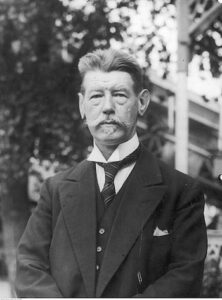
Herman Marie Moens
*Herman Marie Moens was born on September 25, 1875. He was a white self-proclaimed anthropologist and admirer of eugenics.
Herman Marie Bernelot Moens was born in the Netherlands, the son of a naval officer. Although he initially showed little interest in country life, after a mediocre high school result, he enrolled in an education in hunting and forestry. 1900, after his education, Moens became a biology teacher at Zutphen. From 1902 onwards, he traveled to various countries, including Russia and southern Europe. From 1903 to 1906, he was a natural history teacher in Maastricht. He got the idea to use an experiment to prove the theory of evolution, inspired by the social Darwinist ideas of Ernst Haeckel.
In 1908, he proposed fertilizing female gorillas and chimpanzees with the sperm of Black Africans to find the missing link between great apes and humans. Well-known scholars supported this idea. However, he was accused of unethical behavior, and scientists criticized it. He abandoned the idea due to difficulties in securing funding. He traveled through Germany and eventually ended up in Austrian Galicia, where he was an executive at the Dutch-Polish Petroleum Company. By 1914, he had sufficient funds to travel to the United States.
There, he witnessed the racial segregation of people by skin color, and soon, he openly announced that such treatment was prejudice. Because he no longer had access to his money in Europe due to the outbreak of the First World War, he sought work in the U.S. In 1916, he got a job at Roxana Petroleum Corporation, a subsidiary of Royal Dutch Oil.
He met Roscoe Bruce, and he tried to do research on atavisms among mixed blood in schools of color but attracted the attention of American security services because of the lack of scientific quality. Who was watching him as a possible German spy? He was eventually arrested and convicted in 1919 of possessing nude photographs of schoolgirls that he had taken for his research. They were judged to be pornographic. The trial sparked hysterical outrage among the people of Washington. Moens was acquitted on appeal, but a new charge was immediately filed. However, the Justice Department dropped the case in 1923.
In 1926, Moens settled in Paris. He warned of a global race war and advocated miscegenation. To him, humanity was one brotherhood. In 1928, he co-founded the Universal Brotherhood society and later left with his group, Supra Nation, to the International Zone of Tangier. Here, he worked for interracial harmony, tolerance, and peace. Although Moens saw himself as a serious scholar, he had no academic education and was generally rejected by mainstream science.
He missed the nuances of the debate about the role of nature and culture in human evolution. However, his ideas and ideals fit into the broader era of the early 20th century, in which idealist thinkers had prophetic visions about the future of civilization. While traveling through Tunisia and Algeria, Herman Moens died on December 24, 1938.